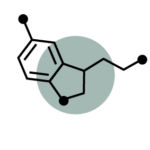Menu
Sample Required: Urine | Test Type: Hormone & Metabolism
Key Advantages
This Neurotransmitters test is available with Metabolites (Comprehensive Neurotransmitter Profile) or without Metabolites (NeuroBasic Profile).
Urinary neuro-biogenic amines provide an overall assessment of a patient’s ability to synthesise and metabolise neurotransmitters, both in the periphery and, for some enzymes, behind the blood brain barrier as well.
Alterations in urinary neurotransmitter status may be associated with a variety of conditions including metabolic disorders, mood/behavioral disorders, and in rare occasions the presence of certain tumours. Associations between urinary neurotransmitter levels and health conditions have been documented in scientific literature and may provide valuable insights as part of a comprehensive health assessment.
Analysis of urinary neuro-biogenic amines (neurotransmitters),and their metabolites, provides a non-invasive assessment of neurotransmitter metabolism. Neurotransmitter testing may provide therapeutic opportunities that improve clinical success and patient health outcomes.
A review of the current scientific literature demonstrates how urinary neuro-biogenic amine testing may be used in clinical practice:
Functional testing – Neuro-biogenic amine metabolism may be mediated by a variety of enzymes, including catechol-O-methyltransferase (COMT) and monoamine oxidase (MAO). Patterns of neurotransmitters and their metabolites may provide functional information about these two important enzymes.
Identify imbalances – research indicates that urinary neuro-biogenic amine measurements may correlate with neurological conditions such as depression and PTSD.
Response to therapy – certain neuro-biogenic amines, such as serotonin, may be altered by the addition of neurotransmitter precursors such as 5-hydroxytryptophan (5-HTP). These changes may be apparent in the urine.
Risk assessment – Changes in urinary serotonin, dopamine, and glutamate levels have been suggested as biomarkers for neurobehavioral toxicology (symptoms from chemical or toxicant element environmental exposures)
Neurotransmitters, or “biogenic amines” are secreted from pre-synaptic neurons into the synapse between nerve cells to stimulate receptors on post-synaptic neurons. The neurotransmitters are all produced from essential aromatic amino acids. Neurotransmitter metabolism may be mediated by a variety of enzymes expressed differently throughout the body. Circulating levels of neurotransmitters and metabolites may have distinctive sources. Urinary levels of neuro-biogenic amines primarily reflect the activity of the peripheral and GIT enteric nervous systems. Up to 20% of urinary neurotransmitters are estimated to originate in the CNS.
A lack of nutritional cofactors (vitamins, minerals) required for normal enzyme function may decrease enzyme function and neurotransmitter levels. Neurotransmitter receptors and metabolic enzymes may be subject to mutations and single nucleotide polymorphisms (SNPs) that may affect receptor or enzyme function. Normal neurotransmitter receptor function is also necessary for normal neurotransmitter activity. Neurotransmitter levels may be influenced by diet, lifestyle and other health conditions such as: high sodium intake, age, gender, body mass index, kidney function, environmental exposures, infection and tobacco use.
Urinary neuro-biogenic amines provide an overall assessment of a patient’s ability to synthesise and metabolise neurotransmitters, which must occur in both the peripheral nervous system and behind the blood brain barrier (BBB). Alterations in urinary neurotransmitter status may result from a variety of conditions including metabolic disorders, mood/behavioral disorders, environmental exposures or (rarely) the presence of certain tumours. Evaluation of neurotransmitters may provide increased clarity about a patient’s health and functional status.
Urinary neuro-biogenic amines are a non-invasive way to assess the synthesis and metabolism of neurotransmitter molecules essential for normal function. Information gained through neurotransmitter testing may provide therapeutic opportunities that improve clinical success and patient health outcomes. Associations between urinary neurotransmitter levels and health conditions have been documented in scientific literature and may provide valuable insight as part of a comprehensive health assessment.
Mon – Fri 8am to 5.00pm NZT
orders@fxmed.co.nz
support@fxmed.co.nz
NZ customers
Free Phone: 0800 439 633
Free Fax: 0800 439 630
Australian customers
Free Phone: 1800 770 904
Free Fax: 1800 665 070

Please note that all products and services found on this website are available to patients through their health practitioner only.
New to FxMed? Set up your account and access leading brands trusted by practitioners in Australia and New Zealand.